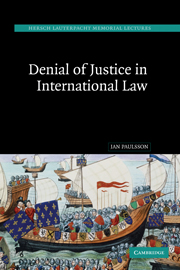Book contents
- Frontmatter
- Table of Contents
- Acknowledgements
- Authorities
- Abbreviations
- 1 The renaissance of a cause of action
- 2 The historical evolution of denial of justice
- 3 Three fundamental developments
- 4 The modern definition of denial of justice
- 5 Exhaustion of local remedies and denial of justice
- 6 Denial of justice by outside interference
- 7 Denial of justice by the decision-maker
- 8 Remedies and sanctions
- 9 The menace of ‘obscure arbiters’?
- Bibliography
- Index
5 - Exhaustion of local remedies and denial of justice
Published online by Cambridge University Press: 29 July 2009
- Frontmatter
- Table of Contents
- Acknowledgements
- Authorities
- Abbreviations
- 1 The renaissance of a cause of action
- 2 The historical evolution of denial of justice
- 3 Three fundamental developments
- 4 The modern definition of denial of justice
- 5 Exhaustion of local remedies and denial of justice
- 6 Denial of justice by outside interference
- 7 Denial of justice by the decision-maker
- 8 Remedies and sanctions
- 9 The menace of ‘obscure arbiters’?
- Bibliography
- Index
Summary
The case for exhaustion
In Loewen, where the documentation put before the arbitral tribunal was particularly exhaustive, the final award noted that:
No instance has been drawn to our attention in which an international tribunal has held a State responsible for a breach of international law constituted by a lower court decision when there was available an effective and adequate appeal within the State's legal system.
The absence of such instances is unsurprising. International law attaches state responsibility for judicial action only if it is shown that there was no reasonably available national mechanism to correct the challenged action. In the case of denial of justice, finality is thus a substantive element of the international delict. States are held to an obligation to provide a fair and efficient system of justice, not to an undertaking that there will never be an instance of judicial misconduct. Writing as rapporteur to the International Law Commission, James Crawford put it this way:
an aberrant decision by an official lower in the hierarchy, which is capable of being reconsidered, does not of itself amount to an unlawful act.
The correctness of this proposition is not open to doubt. Freeman traced it back to the medieval regime of reprisals, which were considered lawful when there was, as da Legnano wrote in 1360, ‘a failure of remedy (propter defectum remedii) arising from the neglect of those who govern’.
- Type
- Chapter
- Information
- Denial of Justice in International Law , pp. 100 - 130Publisher: Cambridge University PressPrint publication year: 2005
- 2
- Cited by



